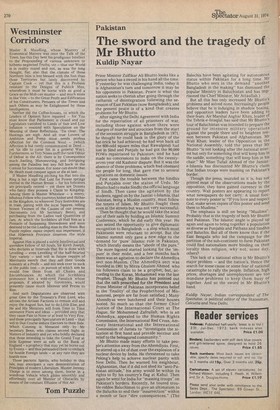Pakistan
The sword and the tragedy of Mr Bhutto
Kuldip Nayar
Prime Minister Zulfikar Ali Bhutto looks like a person who has a sword in his hand all the time. If yesterday he was challenging India, today it is Afghanistan's turn and tomorrow it may be his opponents in Pakistan. Peace is what the nation seeks to cherish after going through the catharsis of disintegration following the secession of East Pakistan (now Bangladesh); and the present peace is of a kind that creates problems for Mr Bhutto. After signing the Delhi Agreement with India for the repatriation of all prisoners of war, including those against whom there were charges of murder and atrocities from the start of the secession struggle in Bangladesh in 1971, he thought he could bask in the glory of the hat-trick he had achieved; he had won back all the 600-odd square miles that Rawalpindi had lost in Sind and Punjab; he had got the 90,000 POWs repatriated to Pakistan; and he had made no concessions to India on the twentyseven-year old Kashmir dispute. But it was the absence of these problems, which had obsessed the people for long, that gave rise to several agitations on domestic issues. First came the trouble between the Sindhis and Punjabis over the status of Urdu. Mr Bhutto had to make Sindhi the official language of Sindh. Then came the agitation by the students, egged on by the Jamiat-i-Islamia, that Pakistan, being a Muslim country, must follow the tenets of Islam. Mr Bhutto fought them even in the streets but was not very successful.
Then he thought that he would take the wind out of their sails by holding an Islamic Summit Conference, which he did early this year. He also seized the opportunity to give diplomatic recognition to Bangladesh — a step which most Pakistanis were reluctant to accept. But the Islamic summit only gave a new edge to the demand for 'pure' Islamic rule in Pakistan, which literally means the "abode of the pure." The more bigoted started looking for the 'impure' in their midst, and a few months back there was an agitation to declare the Ahmediya .sect non-Muslim. (The Ahmediya sect was founded in 1901 by Mirza Ghulam Ahmed who his followers claim to be a prophet; but, •according to the Koran, Mohammad was the last Prophet. Though Mr Bhutto has pointed out that the oath prescribed for the President and Prime Minister of Pakistan incorporates belief in the 'finality' of the Prophethood of Mohammed, people are far from satisfied.) Many Ahemdiyas were butchered and their houses looted. So much so that the former Chief Justice of the International Court at The Hague, Sir Mohammed Zafrullah, who is an Ahmediya, appealed to the Human Rights Commission, the International Red Cross, Amnesty International and the International Commission of Jurists to "investigate the situation at first hand and provide succour and relief to the beleagured community."
Mr Bhutto made many efforts to take people's attention away from the Ahemdiyas. First, he stirred up a lot of dust over the explosion of a nuclear device by India. He threatened to take Peking's help to achieve nuclear parity with New Delhi. Then he warned his neighbour, Afghanistan, that if it did not shed its "anti-Pakistan attitude," his army would be within its rights to fly his country's flag at Kabul. Then again he went for India for "massing troops" on Pakistan's borders. Recently, he toured trouble-ridden Baluchistan to give an ultimatum to the Baluchis to end their "insurrection" within a month or face "dire consequences." (The
Baluchis have been agitating for autonomous status within Pakistan for a long time. Mr Bhutto who sees in the demand "another Bangladesh in the making" has dismissed the popular Ministry in Baluchistan and has imprisoned the Chief Minister, Mr Attaullah.) But all this has only increased Mr Bhutto 's problems and solved none. Increasingly people believe that he is indulging in shadow boxing, and opposition leaders have been adding to their fears. Air Marshal Asghar Khan, leader of the Tehrik-e-Istaq1a1,has said that Mr Bhutto 's tour of Baluchistan was intended to prepare the ground for intensive military operations against the people there and to heighten tension between Pakistan and Afghanistan. Mr Wali Khan, leader of the Opposition in the National Assembly, told the press that Mr Bhutto "is not looking after the national interest but only for something that will keep him in the saddle, something that will keep him in his chair." Mr Mian Tufail Ahmad of the Jamiate-Islamia has discounted Mr Bhutto's claim that Indian troops were massing on Pakistan's border.
Though the press, muzzled as it is, has not printed most of the observations made by the opposition, they have gained currency in the country. Wall posters are appearing to report what newspapers do not carry. A usual footnote,to every poster is: "If you love and respect God, make seven copies of this poster and send them to Muslims."
The emphasis is still on being "Muslims"Probably that is the tragedy of both Mr Bhutto and Pakistan. The Islamic angle is played up again and again to bring together a population as diverse as Punjabis and Pathans and Sindhis and Baluchis. But all of them know that if the East Bengalis who led the campaign for the partition of the sub-continent to form Pakistan could find nationalism more binding on their loyalty then religion, why not, some day, others?
This lack of a national ethos is Mr Bhutto's major problem — and the nation's. Hence the search for some cause or some fear of national catastrophe to rally the people. Inflation, high prices, shortages and unemployment are too mundane problems to keep them busy or together. And so the sword in Mr Bhutto's hand.
Kuldip Nayar, Indian correspondent of The Spectator, is political editor of the Statesman, Calcutta and New Delhi.


































 Previous page
Previous page